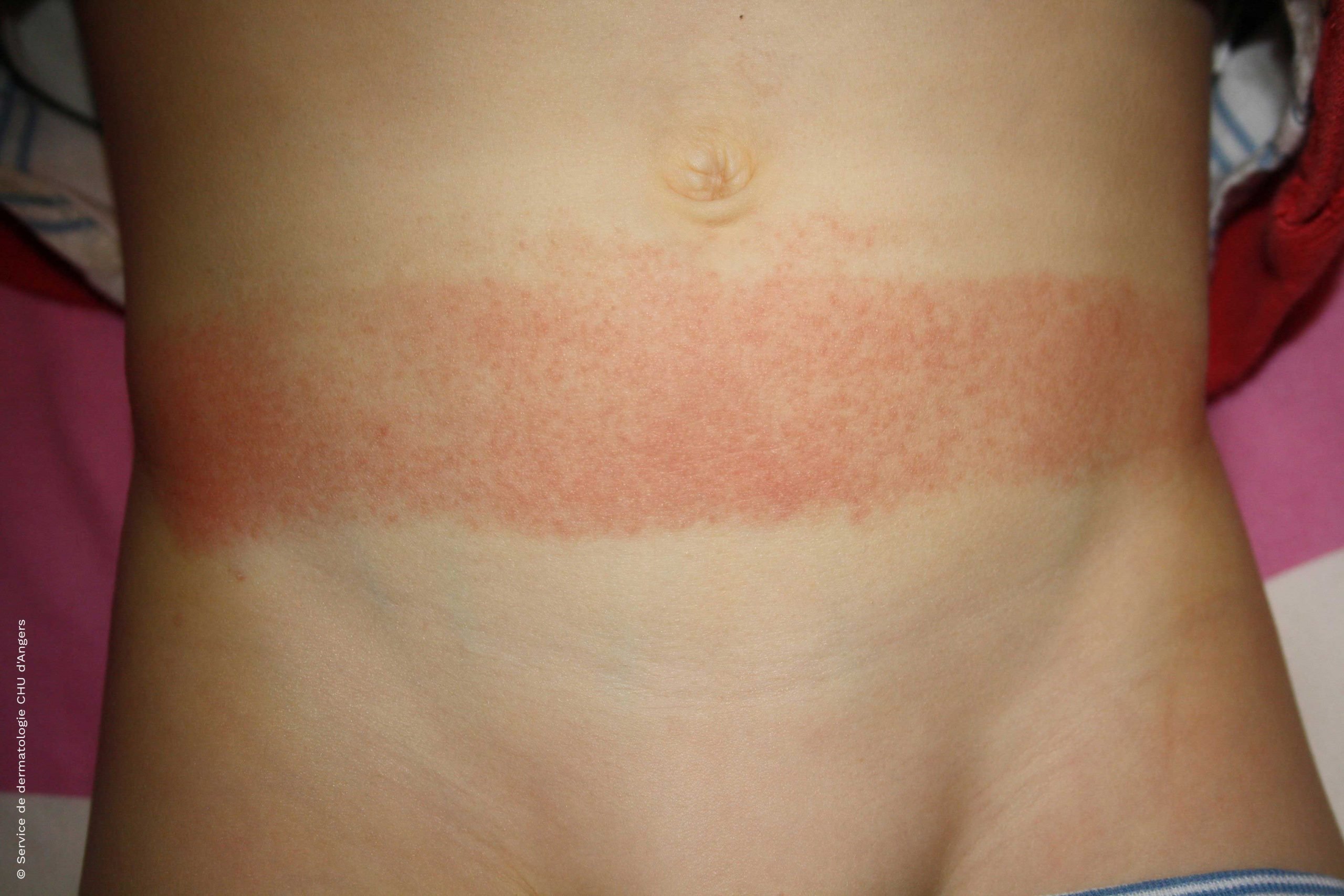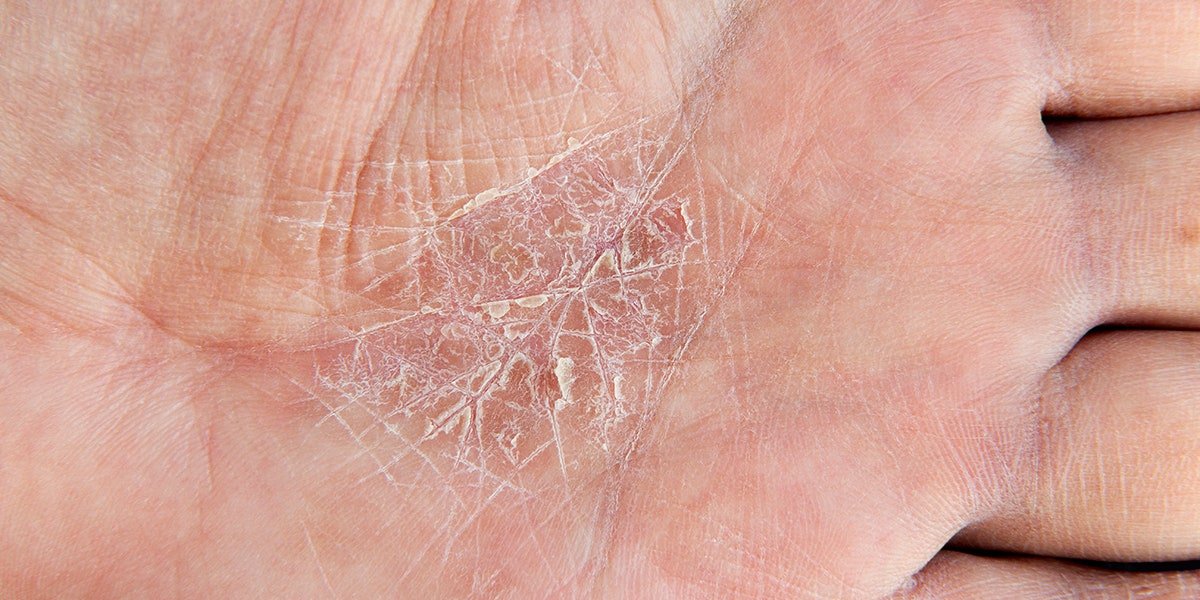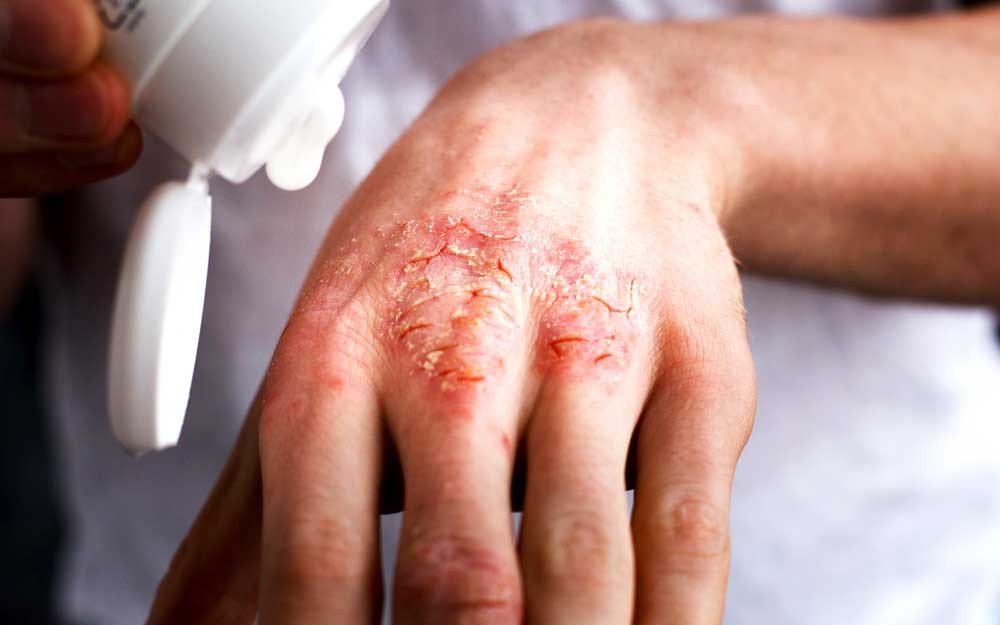Eczema Coping Tips Reducing Skin Irritation
People with eczema have sensitive skin. Irritants such as heat or detergents can easily trigger a bout of eczema.Suggestions for reducing skin irritation include:
- Avoid overheating your skin. Wear several layers of clothing that you can remove, as required, instead of one heavy layer. Dont put too many blankets on your bed and avoid doonas.
- Dont use perfumed bubble bath or bath products labelled medicated.
- Wear soft, smooth materials next to your skin, preferably 100% cotton. Avoid scratchy materials, such as pure wool, polyester or acrylic. You could try a cotton and synthetic mix material this is fine for some people with eczema. Remove labels from clothing.
- Always wear protective gloves when using any type of chemical or detergent. You may want to wear cotton gloves inside rubber or PVC gloves.
- Avoid chlorinated pools. If you have to swim in a chlorinated pool, moisturise your skin well when you get out.
Try To Reduce The Damage From Scratching
Eczema is often itchy, and it can be very tempting to scratch the affected areas of skin.
But scratching usually damages the skin, which can itself cause more eczema to occur.
The skin eventually thickens into leathery areas as a result of chronic scratching.
Deep scratching also causes bleeding and increases the risk of your skin becoming infected or scarred.
Try to reduce scratching whenever possible. You could try gently rubbing your skin with your fingers instead.
If your baby has atopic eczema, anti-scratch mittens may stop them scratching their skin.
Keep your nails short and clean to minimise damage to the skin from unintentional scratching.
Keep your skin covered with light clothing to reduce damage from habitual scratching.
How Is Eczema Diagnosed In Adults
In adults, its important not to diagnose eczema too quickly and ignore other possibilities. It may look like eczema, but other diseases, like skin cancer, may present similarly. So a thorough evaluation is necessary to rule out other serious conditions.
A primary care physician may be able to diagnose your eczema, but they might refer you to a dermatologist for specialized care.
Although theres no specific test to diagnose eczema, a healthcare professional may be able to identify your symptoms as eczema.
You may be asked questions about your:
- family history of allergies and eczema
- personal history of eczema
- skin care routine
- recent stressors
To rule out other conditions, a doctor may order a skin scraping or a small skin biopsy.
Recommended Reading: Why Do Babies Have Eczema
Eczema Symptoms In People Of Color
In People of Color, an eczema rash may appear gray or brown. This can make outbreaks harder to see.
However, People of Color who get eczema may also get dark or light skin patches even after eczema symptoms go away. These can last a long time. Doctors call these patches hyperpigmentation and depigmentation or hypopigmentation.
A dermatologist can evaluate these patches, which may respond to treatments like steroid creams.
The following atopic dermatitis symptoms are common in babies under the age of 2:
- rashes on the scalp and cheeks
- rashes that bubble up before leaking fluid
- rashes that can cause extreme itchiness, which may interfere with sleeping
Food Allergy And Eczema Flare

- Food allergies are a factor in 30% of young children with severe eczema. This factor is mainly seen in babies.
- The main allergic foods are cow’s milk and eggs.
- The main symptoms are increased skin redness and itching. Some parents report these symptoms start during or soon after the feeding.
- The eczema becomes easier to control if you avoid the allergic food.
Don’t Miss: What Helps Eczema Stop Itching
Eczema Treatment: 13 Ways To Find Relief
While there is no cure for eczema, there are a variety of non-invasive eczema treatment options that can provide relief during a flare-up and some that may prevent its onset. These can include corticosteroids, but the following home eczema treatment options may be best.
1. Light Therapy/Phototherapy
According to the National Eczema Association, phototherapy helps to calm inflammation, reduces itching, increases vitamin D production and helps fight bacteria on the skin. Adding 1015 minutes a day of sun exposure, particularly during an eczema flare, can provide relief and potentially speed healing.
2. Vitamin D
In addition to increasing sun exposure, supplementing withvitamin D rich foods like cod liver oil, sardines, salmon, eggs and raw milk may help prevent eczema in children and adolescents. Ideally, during a flare you will get 2,000-5,000 IU daily if your sun exposure is low, consider boosting your intake with a high-quality supplement. Preliminary research shows that low vitamin D levels during pregnancy and during childhood may increase the risk for developing eczema.
3. Moisturize
Because dry skin is both a cause and symptom, it is imperative to moisturize affected areas at least twice a day. Coconut oil is the perfect moisturizer for eczema sufferers. This eczema treatment is antibacterial and anti-fungal, with antimicrobial properties that provide soothing relief, and may speed healing.
4. Treat the Mind and Body
5. Dead Sea Salt Baths
6. Cool, Wet Compresses
What Questions Might My Healthcare Provider Ask To Diagnose Eczema
The conversation with your healthcare provider will need to cover a lot of information. Be sure to be specific about your symptoms.
- Where is your eczema located?
- What have you used to try to treat your eczema?
- What medical conditions do you have? Allergies? Asthma?
- Is there a history of eczema in your family?
- How long have you had symptoms of eczema?
- Do you take hot showers?
- Is there anything that makes your symptoms worse?
- Have you noticed that something triggers or worsens your eczema? Soaps? Detergents? Cigarette smoke?
- Is there so much itchiness that you have trouble sleeping? Working? Living your normal life?
Recommended Reading: Doctors Who Specialize In Eczema
What Are The Treatments For Severe Hand Eczema
If your hand eczema is severe, discuss the possibility of a dermatology referral with your GP. The referral may be for diagnosing contact allergy or for treatment, which may include a short course of oral steroids or immunosuppressants . Alternatively, dermatology departments may recommend alitretinoin or phototherapy, as described below.
How Can I Reduce My Risk
There are steps you can take that may prevent ear eczema outbreaks:
- Establish a skin care routine, and follow your healthcare professionals recommendations for keeping your skin healthy.
- Avoid wool and silk, which can dry out your skin.
- Use a mild soap for your bath or shower, and pat your skin dry instead of rubbing it. Apply a moisturizing cream or ointment immediately after drying your skin to help seal in the moisture. Reapply cream or ointment two to three times a day.
- Take baths or showers with lukewarm water, not hot water.
- Drink at least eight glasses of water each day. Water helps keep your skin moist.
- Avoid sudden changes in temperature and humidity.
- Limit your exposure to known irritants and allergens.
- Avoid scratching or rubbing your irritated skin.
You May Like: Why Is My Eczema Burning
Whats The Difference Between Dermatitis And Psoriasis
Psoriasis and dermatitis can appear similar. Both cause patches of red skin. However, in psoriasis, the scales are thick and the edges of those scales are well-defined.
Discuss with your healthcare provider your questions about which type of skin condition you have. You can have more than one skin condition at a time. Treatments for one may not work for the other.
Be Skeptical Of Supplements Or Vitamins
“There hasn’t been any large-scale studies that prove they work,” Dr. Bhutani explains. Since nothing helps people across the board and some supplements may make your symptoms worse, it’s not necessarily something you want to experiment with. Focus on enriching your diet with healthy nutrient-dense vegetables and the best vitamin supplements when you can.
Don’t Miss: What To Use For Eczema In Ears
Ways To Relieve Itchy Eczema At Home
Apply a cool compress to itchy skin. To use this technique, you:
Telling your child to stop scratching itchy skin rarely works.
Eczema is just too itchy, and telling your child to stop scratching can feel stressful. Stress often makes eczema worse.
Add colloidal oatmeal to your childs bath. Youll find colloidal oatmeal at many places that sell health and beauty products. When you add this to your childs bath, it helps relieve the dry, itchy skin.
When using colloidal oatmeal, dermatologists recommend:
Safety tips
-
Dont let your child eat the finely ground oatmeal.
-
Colloidal oatmeal makes the bath very slippery, so take care to prevent a slip or fall.
Soak in a bath and smear on ointment. After letting your child soak in a lukewarm bath, smear a thick layer of moisturizing ointment on all of your childs skin. When the skin is very itchy, using an eczema friendly ointment like petroleum jelly provides more relief than a cream or lotion.
What Are The Current Treatment Options For Adults With Eczema

There are various types of treatments to manage eczema. A doctor can go over the different options with you and create a treatment plan that works for your specific type of eczema and symptoms.
Treatments can include lifestyle changes, medications , and alternative treatments. Well discuss each of these options in more detail below.
You May Like: How Long Does Eczema Last
What Is Atopic Dermatitis
Atopic dermatitis is a chronic skin disorder. It causes dry, itchy, scaly patches on the skin, often on the face and scalp in babies. Its most common in infants or very young children. Most will show signs of the condition in the first year of life. Symptoms may last until the teens or adulthood. It rarely starts in adulthood. Atopic dermatitis is not contagious.
Atopic dermatitis tends to run in families. This suggests a genetic link. Its also associated with asthma and allergies. These are immune hypersensitivity disorders.
Treatment for this condition is aimed at calming the skin inflammation, decreasing the itching, and preventing infections. Good skin care and medicine to control itching and infection are used.
Atopic dermatitis is often called eczema.
What You Need to Know about Eczema | FAQ
What Is The Difference Between Psoriasis And Ear Eczema
Psoriasis and ear eczema are two different skin conditions. They differ in where the disease appears on your body, how much it itches and how it looks.
Psoriasis is a chronic skin disorder, which means its a skin condition that doesnt go away. People with psoriasis have thick, discolored patches of skin covered with white or silvery scales.
Ear eczema affects the skin in, on and around your ears. Eczema also causes more intense itching than psoriasis. Many people, especially children, can get both eczema and psoriasis.
Also Check: What Does An Eczema Rash Look Like
What Causes Discoid Eczema
The cause of discoid eczema is unknown, although it is often accompanied by dry skin and is thought to be triggered by irritation of the skin.
Discoid eczema tends to affect adults and is rare in children. It is more common among men aged from 50 to 70 and women in their teens or twenties.
Some people with discoid eczema may also have other types of eczema, such as atopic eczema.
Read more about the causes of discoid eczema.
Eczema Around The Eye
When eczema occurs on the face, it often affects the skin around the eyes or eyelids . Eczema that develops near the eyes needs special attention because the eyes themselves can be affected.
Those with eczema around the eyes are more susceptible to certain eye problems such as conjunctivitis , inflamed cornea, and changes in the shape of the cornea .
Read Also: Steroid Cream For Eczema Triamcinolone
Types Of Facial Eczema
Eczema is actually a term for a group of conditions that cause itchy, red, and inflamed skin rashes. The types of eczema that are most likely to appear on the face are:
- Atopic dermatitis: This is the most common type of eczema overall. It is very common on the cheeks and chin, especially in infants. It can also appear around the eyes, on the eyelids, and around the lips. It can, however, occur anywhere on the face or the rest of the body.
- Contact dermatitis: This is also a common type of eczema. It is a skin reaction to a specific irritant. On the face, it is usually found around the eyes, the hairline, and in areas that contact perfumes and jewelry, like the neck and earlobes. But, like atopic dermatitis, this type of eczema can occur anywhere.
- Seborrheic dermatitis: This type most often occurs around the hairline, in the eyebrows, around the ears, and on the sides of the nose.
Eczema Coping Tips Beauty Products
Suggestions for using beauty products include:
- Remember that even hypoallergenic cosmetics can irritate your skin. Whenever possible, keep your face free of make-up.
- Avoid perfumes, fragranced skin lotions and strongly scented shampoos.
- When using a new cosmetic, try testing it first on a small, inconspicuous area of skin such as your forearm. If you experience a reaction, dont use the product again.
Read Also: Ways To Help Baby Eczema
Research And Statistics: Who Has Eczema How Many People Have Eczema
Eczema can occur at any age, but it typically begins in infancy and early childhood.
Journal of the American Academy of Dermatology
National survey data suggest the one-year prevalence of atopic dermatitis among American adults was 10.2 percent in 2010 and 7.2 percent in 2012. But the surveys used different questions: The former referred to “dermatitis, eczema, or any other red, inflamed skin rash” and the latter to “eczema or skin allergy.”
How Do I Treat Or Prevent Diaper Rash

Fortunately for babies and parents alike, treating diaper rash is a straightforward process. If your baby is developing or has diaper rash, follow these steps to help.
You May Like: How Do I Treat Dyshidrotic Eczema
Can You Get Rid Of Eczema
Eczema may be persistent and difficult to treat. A combination of various treatment modalities may be required to treat eczema and control flare-ups. Despite successful treatment, flare-ups may still occur. Treatment of eczema also involves identifying and avoiding skin irritants or food allergies, avoiding extreme temperatures, and frequently lubricating the skin.
Treatment options for eczema include the following:
Topical medications
- Topical medications are medications that are applied externally, over the skin. This includes medicated creams, ointments, and lotions. They are used to reduce swelling, dryness, and itching and help heal the skin. Topical medications that are commonly prescribed for eczema contain corticosteroids. Steroids reduce inflammations and itching, but overuse can cause thinning of the skin. Other creams containing drugs such as Protopic that suppress the white blood cells and hence control skin reactions. Direct strong sunlight should be avoided when these products are being used. Topical antibiotics may be prescribed to treat secondary infection. Regularly applying moisturizers that are free of chemicals, artificial colors, or fragrances will help soothe the skin, hydrate, repair, and soften it as well.
Oral medication
Other therapies
What Questions Should I Ask My Doctor
- How can you tell that I have ear eczema?
- What kind of ear eczema do I have?
- If I dont have ear eczema, what other skin condition might I have?
- Is there a specific brand of moisturizer or skin care ointment that you recommend?
- Is there a prescription cream or ointment that you can prescribe?
- Should I see a dermatologist or another specialist?
- What soaps, lotions, hair care products and other skin care products should I avoid?
- What medications do you recommend?
- What at-home treatments do you recommend?
A note from Cleveland Clinic
Ear eczema is annoying and embarrassing, and it can be alarming if it impacts your hearing. It can affect your quality of life or make you feel self-conscious. However, its common and very normal. With a proper skin care routine and treatment, you can reduce its impact. See your healthcare provider as soon as you notice signs of ear eczema.
Also Check: Eczema That Looks Like Bug Bites
Planning Your Eczema Diet
An eczema diet does not consist of any particular food groups, and no single diet plan is known to be a cure. The purpose of an eczema diet is to replace foods that cause irritation with foods that fight inflammation and reduce eczema symptoms.
Some studies show that certain food groups are more likely to relieve eczema than others. In one study, people with eczema were asked which foods, drinks, or supplements improved their eczema symptoms most. They said:
- Drinking more water
Wrap Up In Cold Weather
Cold, harsh winter winds can dry out the skin and cause eczema flares.
Keep the skin covered when temperatures are low. Also, consider covering the face with a scarf if eczema occurs in this body region.
While many home remedies are suitable for babies and children, always speak with a doctor before using them.
The following home remedies and tips may help:
Also Check: Mustela Baby Face Cream For Eczema